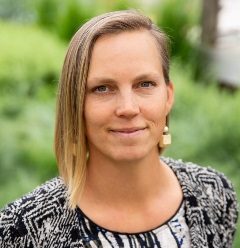Download the Full Program
Keynote Speaker
The Class of 1966 Endowed Lecture
Planning One Health in Policy and Action

Catherine K. Brinkley, VMD, PhD
Associate Professor, Department of Human Ecology
Faculty Director, Center for Regional Change
University of California, Davis
ABSTRACT
Combining design and quantitative sciences, Dr. Catherine Brinkley’s research focuses on planning for One Health. Her early work included a Watson Fellowship designing zoo exhibits to shape public perceptions about the value of conserving wildlife. Following that, she obtained a master’s degree in virology, tracking the spread of a novel zoonotic disease along the seam of the urban-wildlife interface. As a student at the University of Pennsylvania, Dr. Brinkley embarked on a joint veterinary medical degree and PhD in urban planning program to bridge her design and health interests. The Penn VMD-PhD program allowed her to combine expertise on the intertwined health of humans, animals, and environmental systems with a focus on land-use planning that leverages public values to create policies that set aside land for wildlife.
Now, as the Director of the University of California, Davis Center for Regional Change, she is using machine learning to read across hundreds of local plans to understand the many approaches communities are using to reach their shared climate and health goals. In addition, she is working in partnership with scholars across the country to build a National Zoning Atlas, which maps planned development and conservation efforts. Her research seeks to understand whether the many local efforts will sum up to meet the global challenge of climate mitigation—stemming the loss of biodiversity. The participatory action aspect of her work aims to help build local capacity to meet these challenges.
Recently, the 2021 National Climate Task Force recommended a ten-year, locally-led campaign to conserve 30% of terrestrial and marine habitat by 2030. Known as the Thirty-by-thirty (30×30) promise, over 190 countries have adopted the Kunming-Montreal Global Biodiversity Framework at COP15. The aim of these national and global promises is to safeguard environmental and animal health to safeguard human health. Yet, practically, nations can only achieve these promises through local actions. Findings from Dr. Brinkley’s recent research and public-facing tools reaffirm the leading efforts of several communities while building evidence-based pathways and hope for the future of our planet.
ABOUT DR. BRINKLEY
Dr. Catherine Brinkley is an associate professor in human ecology, community and regional development at the College of Agricultural and Environmental Sciences. With a PhD in city and regional planning, a veterinary medical degree, and a master's in virology, her research focuses on health equity and One Health, a concept that considers health shared between humans, animals, and the environment. She is a former Fulbright Scholar, Watson Fellow, and National Science Foundation Career Award Winner.
She advances scholarship and practice on local governance, food systems, and sustainable development. Dr. Brinkley currently serves as the faculty director for the UC Davis Center for Regional Change, with a 16-year history of fostering community-engaged research that centers social equity and environmental justice. Her work is used internationally by the United National Food Agriculture Organization as well as local communities to guide plans.